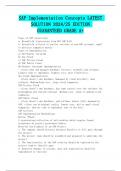Tentamen (uitwerkingen)
SAP Implementation Concepts LATEST SOLUTION 2024/25 EDITION GUARANTEED GRADE A+
- Vak
- Instelling
Types of SAP conversions a. Brownfield (conversions from ECC SAP 6.0) b. Greenfield (clients in earlier versions or non-SAP systems), small to mid-size companies mostly Types of Implementation a) On-Premise (on-prem) b) Any Cloud c) SAP Private Cloud d) SAP Public Cloud On-Premise (on-prem)...
[Meer zien]



